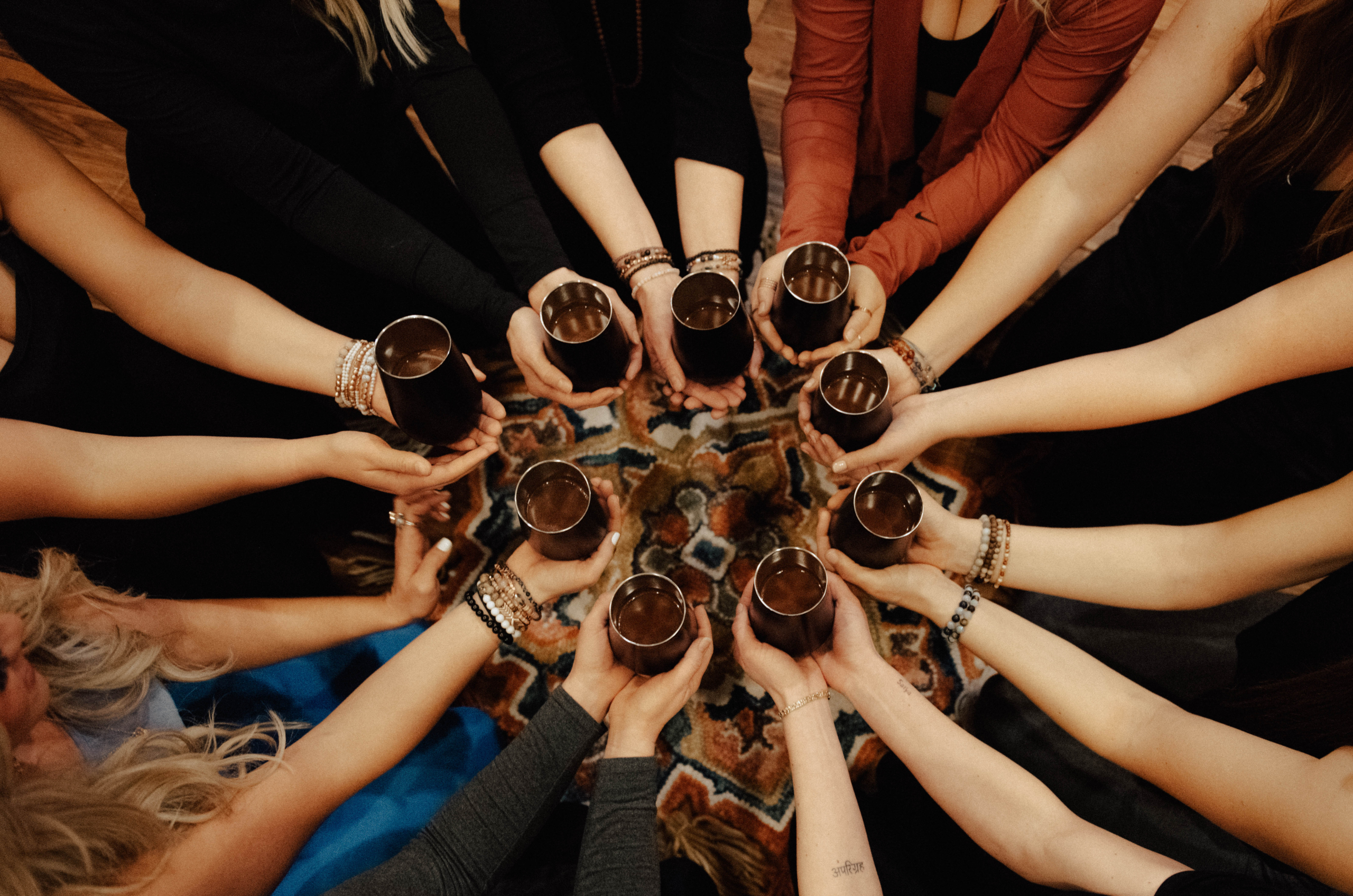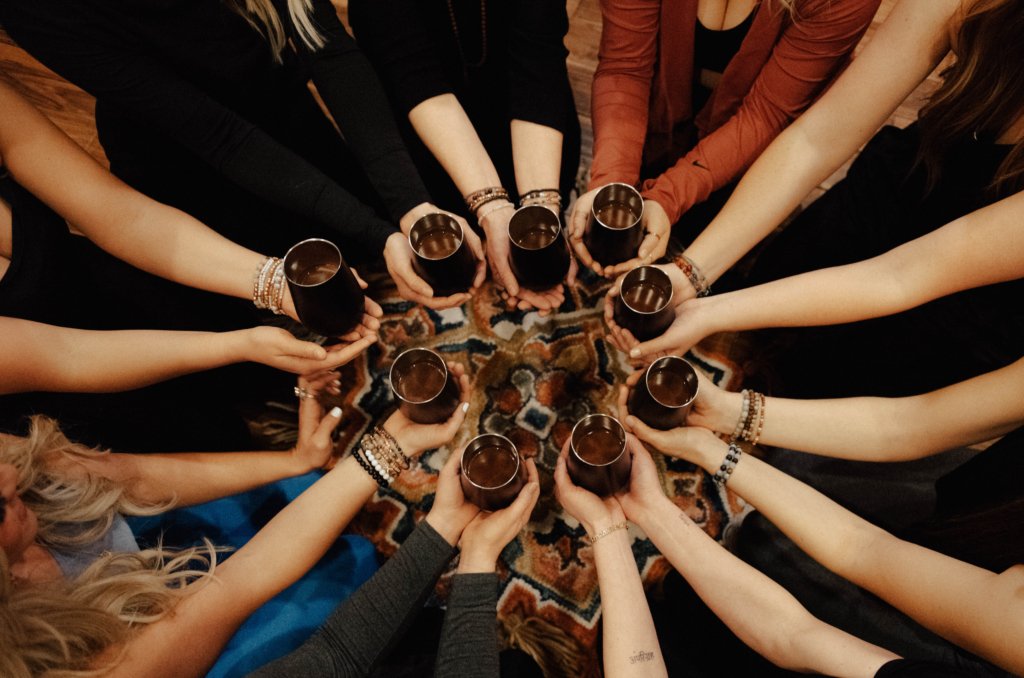This entry was posted on December 19, 2024 by Charlotte Bell.

One of my clearest and most nostalgic memories of my childhood is that of the excitement of Christmas morning. Our parents would gather my two sisters and me together so we could all converge on the living room simultaneously, run to our piles of presents and ooooh and ahhhh in unison. The excitement of having my wishes granted and the surprise of receiving gifts I didn’t ask for was so much fun. This excitement sustained me throughout the day as we visited relatives and friends.
But the next day was always a different story. I remember the hollow feeling knowing that the orgy of getting stuff was over. Life had returned to its uninteresting normal. I still had a few things, but inevitably, some would have already lost their shine. It wasn’t until much later that I began to understand that the joy my parents felt in giving was a much more lasting feeling than the excitement of getting what I longed for.
The difference between heaven and hell
A traditional Chinese parable tells the story of an old man who knows he will soon die. Worried about the afterlife, he seeks out the village sage and asks him to tell him about paradise and hell. The wise man said: “Come and follow me.”
They travel a long way until they arrive at a large house. Upon entering, they discover a huge dining room. In the center of the room is a long wooden table on which rests a sumptuous buffet of unimaginable proportions: all the culinary delights anyone could desire. Many frustrated and unhappy people are coming to the table. They have been given twelve-foot-long chopsticks and are therefore unable to feed themselves. The food remains untouched, the people hungry and unsatisfied. The old man said, “This must be hell.” »
They walk down the path a little further until they reach a similar large house. Inside, they find the same beautiful buffet, the same circle of people, the same twelve-foot wands. However, in this scenario there is a lot of laughter and togetherness. People here have learned to use impossible utensils. “In heaven,” said the professor, “people feed each other. »
Generosity benefits both the giver and the receiver
It is said that the Buddha said to his monks: “If you knew, like me, the power of generosity, you would never let a meal pass without sharing some of it. » In Asian spiritual traditions, the practice of Dana, or generosity, is the foundation of spiritual life. Rather than starting with rigorous meditation practices, seekers first learn to practice more material disciplines, the first being the cultivation of generosity.
The Buddha spoke of the freedom to let go. Our attachments to our material possessions, relationships, and beliefs prevent us from seeing our own limitless nature. When we practice giving, we learn the joy of letting go. No matter the magnitude of an act of generosity; in each case, we cultivate the habit of letting go. Every time we give, we can appreciate the benefits to ourselves and others, which motivates us to share again.
In his book, Lovingkindness: the revolutionary art of happinessSharon Salzberg says that “giving brings happiness at every stage of its expression.” We experience joy by forming the intention to be generous; we experience joy in the very act of giving something; and we experience joy in remembering the fact that we have given.
“A simple act of giving has value beyond what we can imagine,” says Salzberg. “A large part of the spiritual path is expressed and realized in giving: love, compassion, sympathetic joy, serenity. »
How to practice generosity
There are many creative ways to cultivate generosity in our lives. One solution is to resolve to follow through every time we feel the urge to give. As I practiced this resolution, I found that I often heard the voices of my own lack almost instantly. These voices remind me that I may one day need to be given the item, or that I may not be able to afford to share it. While it is wise to consider the extent of my generosity based on the resources I have available, when the impulse arises, I always follow it in one way or another. I never found myself wanting because I gave.
Here are some additional ideas: Buy a gift or share a meal. Donate some of your belongings to a friend or charity. Volunteer some of your time and energy, perhaps by volunteering for a nonprofit group or working at a shelter. Be available to the people around you. Make a phone call to a distant friend. Write an old-fashioned handwritten letter. The next time a friend wants to tell you a story or ask you for advice, really listen. An act of generosity does not have to be grandiose.
So be generous with yourself. Allow yourself to celebrate the joy you have created in the lives of others and in your own. There is a huge difference between the feelings of expansion that accompany an act of giving and the feelings of restriction that accompany the habit of wanting or hoarding. Allowing yourself to feel the blessings of giving can be a great motivator for future acts of kindness.
Cultivating generosity is a practice. There are times when it will be easy and others when it won’t be so easy. There are times when we give freely and others when we give with reservation. But with practice, like any other quality we choose to develop, generosity can flow freely and naturally. It can be not only a quality we possess, but also who we are.
About Charlotte Bell
Charlotte Bell discovered yoga in 1982 and began teaching in 1986. Charlotte is the author of Mindful Yoga, Mindful Life: A Guide for Everyday Practice, and Yoga for Meditators, both published by Rodmell Press. Her third book is Hip-Healthy Asana: The Yoga Practitioner’s Guide to Protecting the Hips and Avoiding SI Joint Pain (Shambhala Publications). She writes a monthly column for CATALYST magazine and is the editor-in-chief of Yoga U Online. Charlotte is a founding board member of GreenTREE Yoga, a nonprofit organization that brings yoga to underserved populations. A lifelong musician, Charlotte plays oboe and English horn in the Salt Lake Symphony and the folk sextet Red Rock Rondo, whose DVD won two Emmy Awards.

purchase amoxicillin for sale – order amoxicillin for sale purchase amoxil sale
buy generic amoxicillin online – amoxicillin without prescription cheap amoxicillin
buy fluconazole tablets – https://gpdifluca.com/# fluconazole medication
order diflucan 100mg generic – https://gpdifluca.com/ buy generic diflucan 200mg
buy cenforce generic – cenforcers.com buy generic cenforce
cenforce 100mg brand – https://cenforcers.com/ buy generic cenforce 50mg
cheap canadian cialis – cialis soft tabs cialis with out a prescription
cialis tadalafil tablets – https://ciltadgn.com/# cheapest cialis
para que sirve las tabletas cialis tadalafil de 5mg – https://strongtadafl.com/# cialis from india
compounded tadalafil troche life span – https://strongtadafl.com/# what is the generic name for cialis
ranitidine buy online – purchase zantac generic zantac 300mg pills
cialis viagra levitra for sale – sildenafil citrate ip 100 mg sildenafil 50mg tablets price
sildenafil citrato 100 mg – https://strongvpls.com/# cheap generic viagra on line
More text pieces like this would create the интернет better. https://gnolvade.com/es/comprar-viagra-en-espana/
This is a theme which is virtually to my verve… Myriad thanks! Exactly where can I lay one’s hands on the acquaintance details for questions? neurontin 800 mg para que sirve
I’ll certainly bring back to read more. https://buyfastonl.com/amoxicillin.html
More articles like this would frame the blogosphere richer. prednisone 50 mg price
More posts like this would force the blogosphere more useful. https://ursxdol.com/amoxicillin-antibiotic/
I’ll certainly carry back to review more. https://ursxdol.com/cenforce-100-200-mg-ed/
I am in truth enchant‚e ‘ to glance at this blog posts which consists of tons of of use facts, thanks towards providing such data. https://prohnrg.com/
Greetings! Very useful suggestion within this article! It’s the petty changes which choice turn the largest changes. Thanks a a quantity in the direction of sharing! purchase loratadine pills
I’ll certainly carry back to be familiar with more. web
This is the amicable of glad I have reading. Г©quivalent viagra homme
More posts like this would make the online time more useful. https://ondactone.com/spironolactone/
The sagacity in this tune is exceptional. https://ondactone.com/product/domperidone/
With thanks. Loads of expertise!
https://doxycyclinege.com/pro/dutasteride/
This is the kind of literature I in fact appreciate.
https://doxycyclinege.com/pro/levofloxacin/
I couldn’t hold back commenting. Profoundly written! http://sols9.com/batheo/Forum/User-Fjpkyz
The thoroughness in this break down is noteworthy. http://zqykj.com/bbs/home.php?mod=space&uid=302508
cost forxiga 10 mg – janozin.com buy dapagliflozin 10 mg for sale
dapagliflozin 10 mg cheap – https://janozin.com/# buy generic forxiga
orlistat pill – https://asacostat.com/ orlistat pill
buy generic xenical over the counter – https://asacostat.com/# order orlistat 60mg without prescription
This is the big-hearted of literature I positively appreciate. http://www.dbgjjs.com/home.php?mod=space&uid=533048
This website positively has all of the bumf and facts I needed about this subject and didn’t identify who to ask. http://www.dbgjjs.com/home.php?mod=space&uid=532971
You can conserve yourself and your family by way of being wary when buying prescription online. Some druggist’s websites operate legally and provide convenience, secretiveness, rate savings and safeguards for purchasing medicines. buy in TerbinaPharmacy https://terbinafines.com/product/zantac.html zantac
You can keep yourself and your family close being cautious when buying medicine online. Some pharmaceutics websites function legally and sell convenience, reclusion, sell for savings and safeguards for purchasing medicines. buy in TerbinaPharmacy https://terbinafines.com/product/inderal.html inderal
More articles like this would pretence of the blogosphere richer. on this site
Thanks an eye to sharing. It’s outstrip quality. TerbinaPharmacy
More articles like this would remedy the blogosphere richer.
I am in point of fact enchant‚e ‘ to gleam at this blog posts which consists of tons of profitable facts, thanks for providing such data.